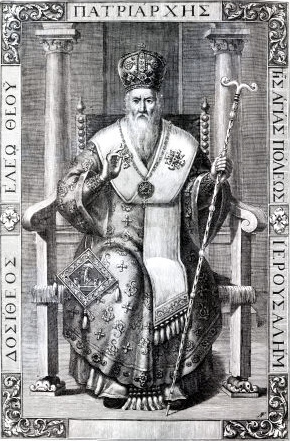John Komnenos Molyvdos
John Komnenos Molyvdos was a prominent Byzantine scholar, physician, and official who lived during the 12th century. His contributions to the fields of medicine, philosophy, and public administration have been noted in various historical texts, highlighting his versatility and impact on Byzantine intellectual life.
Early Life and Education[edit | edit source]
Little is known about the early life of John Komnenos Molyvdos, including his exact birth date and place. He was a member of the distinguished Komnenos family, which had produced several emperors of the Byzantine Empire. This connection likely afforded him opportunities in education and career advancement that were unparalleled at the time. Molyvdos received a comprehensive education, excelling in both the humanities and sciences, which was typical for members of the Byzantine elite.
Career[edit | edit source]
John Komnenos Molyvdos's career is notable for its diversity. He served the Byzantine Empire in various capacities, including roles in the imperial court and possibly in the military. However, his most enduring contributions were in the fields of medicine and education.
Medicine[edit | edit source]
As a physician, Molyvdos was known for his application of classical medical knowledge, particularly that of Galen, to treat patients. His work contributed to the preservation and expansion of ancient Greek medical texts, which were central to Byzantine medical practice.
Education[edit | edit source]
Molyvdos was also deeply involved in the intellectual life of the empire. He is credited with teaching and mentoring several future scholars and officials, thereby influencing the next generation of Byzantine leadership. His teachings likely covered a wide range of subjects, from philosophy and rhetoric to medicine and theology.
Legacy[edit | edit source]
John Komnenos Molyvdos's legacy is primarily preserved through references in the writings of his contemporaries and later Byzantine historians. While direct records of his works are scarce, his impact on Byzantine intellectual and cultural life is undisputed. He represents the archetype of the Byzantine polymath, contributing to the empire's tradition of scholarship and public service.
See Also[edit | edit source]
- Byzantine Empire
- Komnenos dynasty
- Medicine in the medieval Islamic world
- History of philosophy in Eastern Europe
Search WikiMD
Ad.Tired of being Overweight? Try W8MD's physician weight loss program.
Semaglutide (Ozempic / Wegovy and Tirzepatide (Mounjaro / Zepbound) available.
Advertise on WikiMD
|
WikiMD's Wellness Encyclopedia |
| Let Food Be Thy Medicine Medicine Thy Food - Hippocrates |
Translate this page: - East Asian
中文,
日本,
한국어,
South Asian
हिन्दी,
தமிழ்,
తెలుగు,
Urdu,
ಕನ್ನಡ,
Southeast Asian
Indonesian,
Vietnamese,
Thai,
မြန်မာဘာသာ,
বাংলা
European
español,
Deutsch,
français,
Greek,
português do Brasil,
polski,
română,
русский,
Nederlands,
norsk,
svenska,
suomi,
Italian
Middle Eastern & African
عربى,
Turkish,
Persian,
Hebrew,
Afrikaans,
isiZulu,
Kiswahili,
Other
Bulgarian,
Hungarian,
Czech,
Swedish,
മലയാളം,
मराठी,
ਪੰਜਾਬੀ,
ગુજરાતી,
Portuguese,
Ukrainian
Medical Disclaimer: WikiMD is not a substitute for professional medical advice. The information on WikiMD is provided as an information resource only, may be incorrect, outdated or misleading, and is not to be used or relied on for any diagnostic or treatment purposes. Please consult your health care provider before making any healthcare decisions or for guidance about a specific medical condition. WikiMD expressly disclaims responsibility, and shall have no liability, for any damages, loss, injury, or liability whatsoever suffered as a result of your reliance on the information contained in this site. By visiting this site you agree to the foregoing terms and conditions, which may from time to time be changed or supplemented by WikiMD. If you do not agree to the foregoing terms and conditions, you should not enter or use this site. See full disclaimer.
Credits:Most images are courtesy of Wikimedia commons, and templates, categories Wikipedia, licensed under CC BY SA or similar.
Contributors: Prab R. Tumpati, MD


